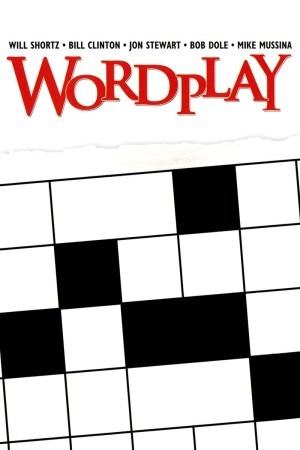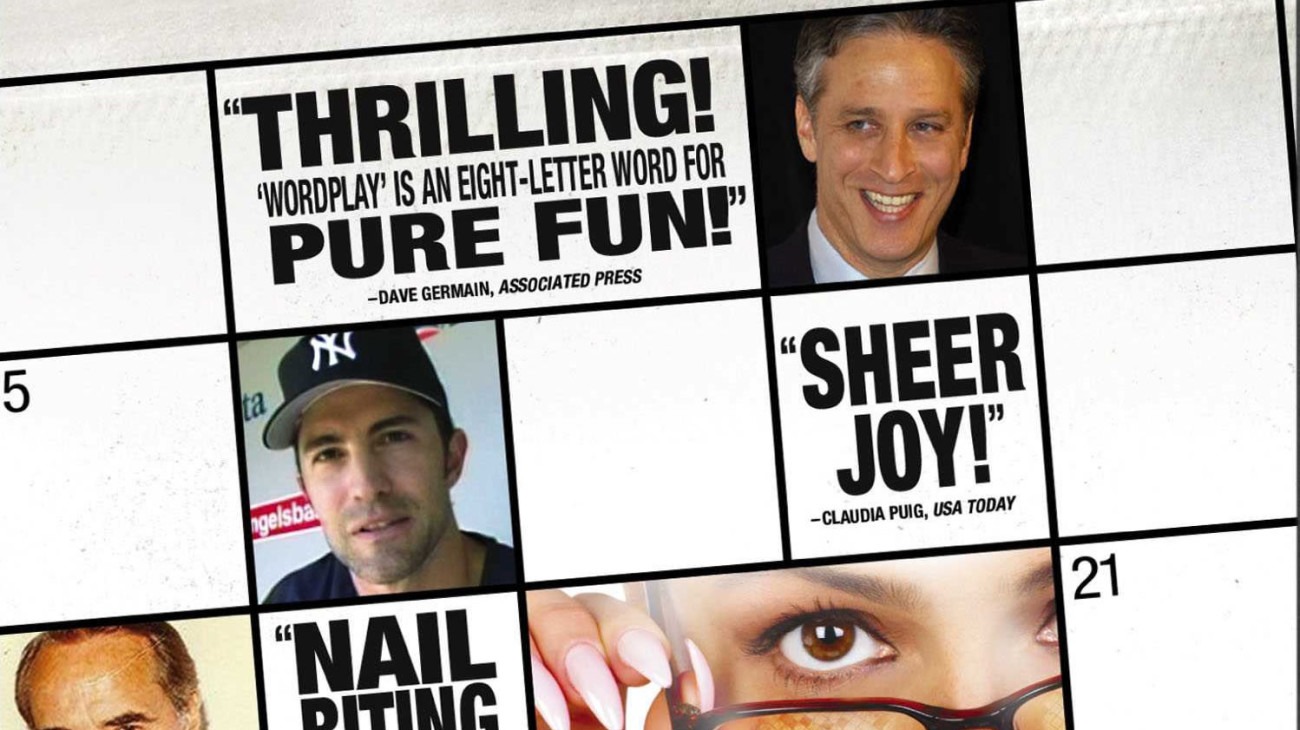
It's a little boxy
I should hasten to say that I don't think Wordplay is an undeserving or uninteresting film. I don't think that's the case. But it is one of my weaknesses that I don't really know how to talk about documentaries in any reasonably smart way. I haven't seen that many (not even Spellbound, the evident influence for the current subject), and I'm rarely in love with the ones I've seen, except that they were directed by Werner Herzog, a man whose body of work functions primarily to muddy the distinction between documentary and fiction.
My difficulty with the genre is its lack of artfulness; not that there are not artistically sound documentaries, but that it's a much less predetermined type of filmmaking - much less about the meaning of the edit and the meaning of the image, much more about the story and the subject. And I don't mean to belittle the editors or cinematographers of documentaries, for I know that it takes a great deal of skill to be either. I am only speaking to my own discomfort in talking about the language of a film in which the mise en scène is out of the filmmakers' control.
What I can say about Wordplay comfortably is that it's too long. Really, it's basically two movies: a talking-heads exploration of crossword puzzle culture in general, and the New York Times crossword puzzle specifically; and the events of the 28th Annual Crossword Puzzle Championship in Stamford, Connecticut in March 2005.
I can see why the two films have been combined: the cast is largely overlapping, with Will Shortz of the Times hosting the championship, and many of the nation's experts on crossword puzzles are competitors. I can easily imagine that the film developed along these lines: Patrick Creadon desired to explore crosswords in America, interviewed people from across the country, learned about this competition, and decided that it would make a perfect third act for his project. He was not correct. The first hour or so of the film is a perfectly self-contained object: we meet Merl Reagle, puzzle-creator extraordinaire, who obliges Creadon by basing a puzzle around the phrase "word play," we see the extraordinary process by which a genius cranks out a puzzle (the best scene in the film, for me, is when Reagle explains why he's worried about the location of an "A" and "Y"; the connections he makes are incredibly esoteric, yet he seems almost apologetic, like he hates to waste our time on such obvious information). Lastly, we observe a group of famous people and crossworders, whom we have heard from throughout, solving the "Word Play" puzzle.
It's satisfying and has a punchy close, and it feels altogether like a really great television piece. And then the second movie kicks in, a pointless attempt to give the film a narrative spine, and we watch the trials and tribulations of a set of crossword experts competing for the national title. I'd be a liar if I said it wasn't engrossing, even nervewracking; and the film's primary stroke of cinematic innovation is the clever way in which it dramatizes the act of filling in a crossword. But none of that makes it necessary. It's really just bloated, and it speaks to the fear that nobody will watch a movie without a plot and conflict, although the best and most interesting parts of the film are clearly to be found in its interviews.
Given that the appeal of the film lies entirely in the anecdotes, I'll not spoil any of them (ostensibly, the competitors are meant to be interesting as well, but I could never shake the feeling that they are sad and lonely people who are wasting their lives. Saith the blogger). There's a lot of interesting things to be said about the ways in which people do the NYT puzzle, and the reasons they do so, and on that count the film is a success. Unfortunately, it can't ignore the fact that those things all take considerably less than 94 minutes to say.
7/10
4:13 - Edited to make it clear that I have never seen Spellbound.
My difficulty with the genre is its lack of artfulness; not that there are not artistically sound documentaries, but that it's a much less predetermined type of filmmaking - much less about the meaning of the edit and the meaning of the image, much more about the story and the subject. And I don't mean to belittle the editors or cinematographers of documentaries, for I know that it takes a great deal of skill to be either. I am only speaking to my own discomfort in talking about the language of a film in which the mise en scène is out of the filmmakers' control.
What I can say about Wordplay comfortably is that it's too long. Really, it's basically two movies: a talking-heads exploration of crossword puzzle culture in general, and the New York Times crossword puzzle specifically; and the events of the 28th Annual Crossword Puzzle Championship in Stamford, Connecticut in March 2005.
I can see why the two films have been combined: the cast is largely overlapping, with Will Shortz of the Times hosting the championship, and many of the nation's experts on crossword puzzles are competitors. I can easily imagine that the film developed along these lines: Patrick Creadon desired to explore crosswords in America, interviewed people from across the country, learned about this competition, and decided that it would make a perfect third act for his project. He was not correct. The first hour or so of the film is a perfectly self-contained object: we meet Merl Reagle, puzzle-creator extraordinaire, who obliges Creadon by basing a puzzle around the phrase "word play," we see the extraordinary process by which a genius cranks out a puzzle (the best scene in the film, for me, is when Reagle explains why he's worried about the location of an "A" and "Y"; the connections he makes are incredibly esoteric, yet he seems almost apologetic, like he hates to waste our time on such obvious information). Lastly, we observe a group of famous people and crossworders, whom we have heard from throughout, solving the "Word Play" puzzle.
It's satisfying and has a punchy close, and it feels altogether like a really great television piece. And then the second movie kicks in, a pointless attempt to give the film a narrative spine, and we watch the trials and tribulations of a set of crossword experts competing for the national title. I'd be a liar if I said it wasn't engrossing, even nervewracking; and the film's primary stroke of cinematic innovation is the clever way in which it dramatizes the act of filling in a crossword. But none of that makes it necessary. It's really just bloated, and it speaks to the fear that nobody will watch a movie without a plot and conflict, although the best and most interesting parts of the film are clearly to be found in its interviews.
Given that the appeal of the film lies entirely in the anecdotes, I'll not spoil any of them (ostensibly, the competitors are meant to be interesting as well, but I could never shake the feeling that they are sad and lonely people who are wasting their lives. Saith the blogger). There's a lot of interesting things to be said about the ways in which people do the NYT puzzle, and the reasons they do so, and on that count the film is a success. Unfortunately, it can't ignore the fact that those things all take considerably less than 94 minutes to say.
7/10
4:13 - Edited to make it clear that I have never seen Spellbound.
Categories: documentaries






